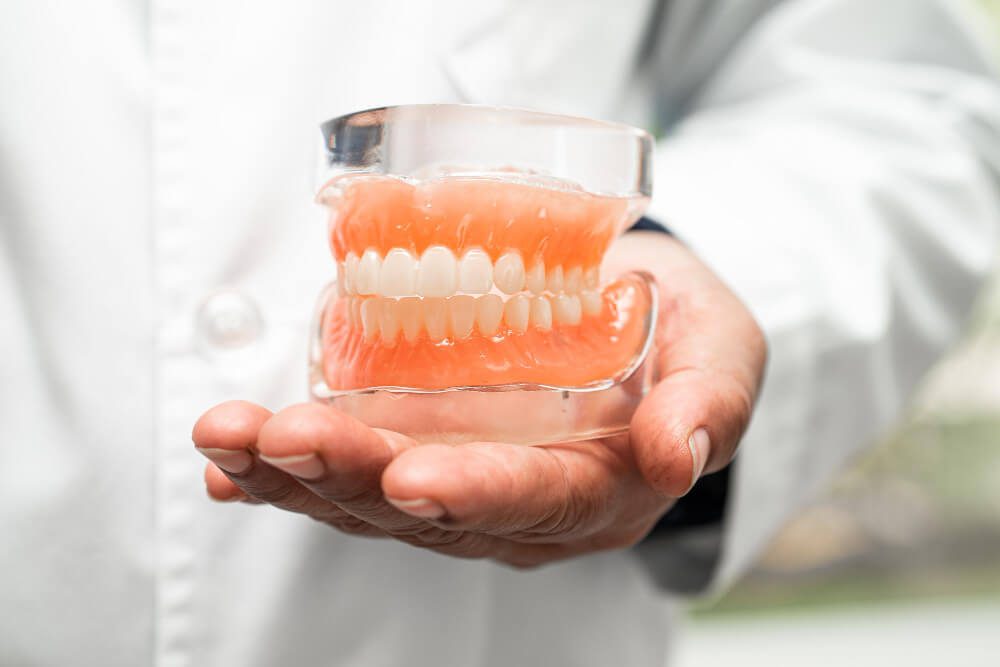Can Dentures Be Fitted to Receding Gums? Solutions for Comfortable Fit

Dentures have long provided an essential solution for those who want to replace missing teeth, restoring both function and aesthetic appeal. But when the gums — the foundation that supports dentures — begin to recede, a common question arises: Can dentures still be fitted comfortably and securely to receding gums?
The answer is yes — but it takes a personalised approach. Receding gums introduce challenges that require thoughtful planning, tailored techniques, and ongoing dental care to ensure a comfortable, long-term fit.
This article will explore what causes gum recession, how it affects denture fitting, and what solutions are available to keep your smile functional and comfortable.
Understanding Receding Gums
Gum recession is the process by which the gums recede from the teeth, revealing the underlying bone or tooth roots. This process can create small pockets where bacteria thrive, increasing the risk of infection, tooth decay, and even tooth loss—all of which can complicate denture fitting.
Common causes include:
- Gingivitis or Periodontal Disease: These bacterial gum infections destroy gum tissue and the anchor bone that holds teeth in place. Periodontitis is the primary cause of gum recession.
- Genetics: Surprisingly, some people may be predisposed to gum disease. Even if they maintain perfect oral hygiene, they may experience gum recession.
- Aggressive tooth Brushing: Brushing your teeth forcefully or using a hard-bristled toothbrush can cause the tooth enamel to wear away and the gums to tear down.
- Insufficient Dental Care: Inadequate brushing, flossing, and rinsing with antibacterial mouthwash can make it easy for plaque to turn into calculus (tartar), a hard substance that can only be removed by a dentist and that promotes gum recession.
- Hormonal Changes: Shifts in hormones, like those occurring during puberty, pregnancy, and menopause, can make gums more sensitive and vulnerable to gum recession.
Why Receding Gums Complicate Denture Fitting
When gums recede, they often lose their natural, snug shape. This can lead to several challenges:
- Lack of Support: Receding gums can reduce the denture’s surface area to grip onto. This may cause the denture to become loose or unstable, affecting speech, chewing, and overall comfort.
- Altered Aesthetics: With the loss of gum tissue, dentures might not fill out the mouth as they should. This can change the facial appearance, making the lower third of the face appear “collapsed.”
- Increased Sensitivity: Gum recession exposes the tooth’s root or the underlying jawbone, and fitting a denture over these areas can lead to discomfort due to pressure or friction.
Because gum recession can be progressive, even a well-fitting denture may need future adjustments. That’s why regular dental visits and custom solutions are essential.
Solutions for Comfortable Denture Fit with Receding Gums
Despite the challenges, modern dentistry offers several techniques to help you achieve a secure, comfortable denture fit — even with receding gums.
1. Custom-Fitted Dentures
A custom-fit is critical. These dentures are designed using highly accurate impressions that consider every contour of your gums—even as they recede.
- Accurate Impressions: The denture-making process starts with taking precise impressions of the mouth. Advanced techniques and materials help capture every detail, ensuring the resultant denture aligns well with the receding gum line.
- Adjusting the Denture Base: As gums recede, the denture base may need modifications. Dental professionals can adapt and reshape the base to ensure it rests comfortably against the gum, minimising pressure on sensitive areas. They may also require additional treatments, such as gum grafting.
2. Soft Liners for Added Comfort
Soft liners can be effective for individuals with significantly receded or tender gums.
- Adaptable Fit: Soft liners, made from a pliable material, adjust to the contours of the gums, offering a more comfortable fit.
- Shock Absorption: They act as a cushion, absorbing the forces from biting and chewing and reducing the impact on sensitive gum graft areas.
3. Overdentures or Implant-Supported Dentures
For those struggling with a lack of retention due to receding gums, overdentures anchored to dental implants can be a game-changer.
- Enhanced Stability: Implants provide a solid foundation, ensuring that dentures remain securely in place, regardless of gum condition, which helps prevent gum disease.
- Reduced Gum Pressure: Implants provide primary support, so there’s less reliance on the gums. This reduces the potential for sore spots and discomfort in receded areas.
4. Denture Relining
Gum shapes can change over time, so even the best-fitted dentures may become loose. Relining adjusts the denture’s internal surface to match your gums’ current shape.
- When to consider: If your dentures feel loose, uncomfortable, or start to cause sore spots.
- How it helps: Regular relining can extend the life of your denture and maintain comfort despite ongoing gum changes.

Staying Ahead: Why Ongoing Care Matters
Fitting dentures to receding gums isn’t a one-time fix — it’s a process. Regular dental check-ups allow for the following:
- Monitoring gum changes
- Making timely adjustments
- Preventing complications like infections or sore spots
By working closely with your Auburn dentist, you can stay ahead of changes and ensure your dentures feel natural and supportive.
Conclusion
So, can dentures be fitted to receding gums? Absolutely — with the right solutions.
Whether through custom-fitted designs, soft liners, implant-supported options, or regular relining, there are multiple ways to achieve a secure and comfortable fit. The key is recognising that receding gums doesn’t mean sacrificing function or comfort.
Dentures in Auburn
If you’re facing gum recession or denture fit challenges, let us help you find the right solution. Our team is here to guide you through your options and restore your confidence in your smile.
To schedule a consultation with your Auburn dentist, contact My Local Dentists at (02) 8214 8999 or visit us at Shop Q50, Auburn Central Shopping Centre, 57-59 Queen Street, Auburn.
Let’s find the fit that works for you — comfortably and confidently.
